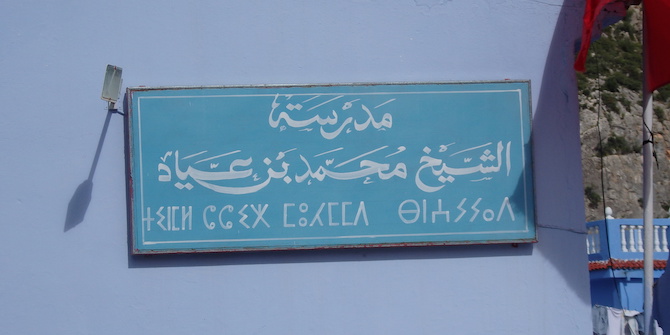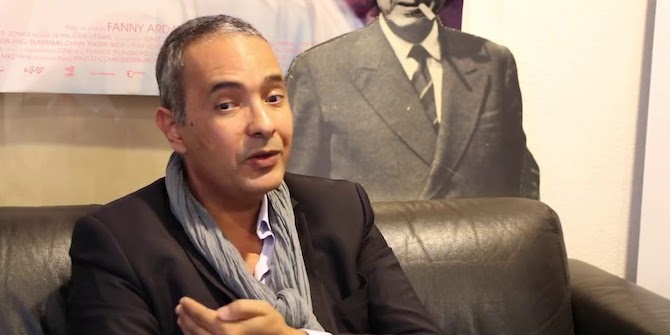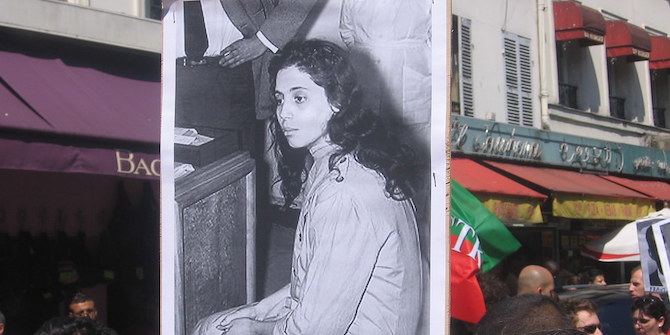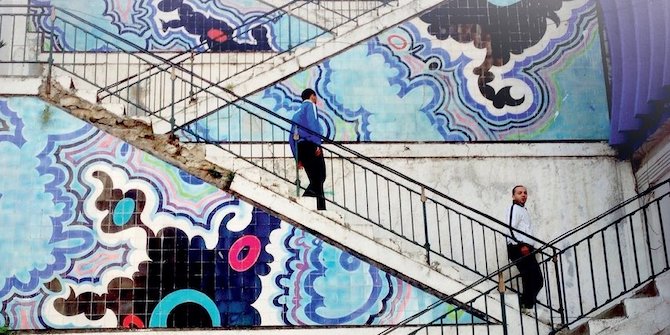by Lillian Flemons

Both language politics and women’s rights have constituted key points of contention in the wars and debates over Algeria’s identity since its independence, yet very little research has been conducted on the relationship between the two. Over the past few decades, scholarly claims have been made, with scant evidence, that Algerian women have turned to French as a language in which they can find a freedom that does not exist for them in the enforced Arabic of the patriarchal ruling elite. Yet the very fact of understanding the Algerian linguistic landscape in such binary terms – the ex-colonisers’ French vs the government’s Arabic – elides the Algerian socio-linguistic reality altogether. In fact, the majority of communication is dominated by different languages altogether: derja, ‘or Algerian Arabic’, and any one of the multiple Berber tongues. The policy of Arabisation – in place since independence – that has imposed an indeterminate mix of Classical and Modern Standard Arabic as the national tongue, is in practice a rejection not so much of the ex-colonisers’ language, but of the native speech of the vast majority of Algerians.
So where does gender come into all this? How can the oppression of a people’s native language(s) play a role in the oppression of women? Can language policy function as a tool for not only maintaining but also naturalising unjust social inequalities?
Emerging only in recent decades, Critical Language Policy theory argues just this. Not only is language policy inherently ideological, but those who exercise control over linguistic resources also control a number of other resources, both symbolic and material, and naturalise their right to do so. A survey of four hundred Algerians and nine in-depth interviews with Algerian women have led to some insights in this respect.
In the first instance, Arabisation in Algeria has historically borne the associated weight of Islam, here deployed not so much as a faith but rather as a tool for ideological control, that is, as a means for disseminating and reinforcing what can and cannot be thought and expressed. Because ‘official’ Arabic is used only in official spheres, the ruling elite has control over the kind of discourse that language has the power to transmit. Moreover, my interviewees described how the Arabisation of the education system has led to the introduction into schools of foreign Arabic-language teachers who considered their presence a missionary rather than educational one: ‘instead of teaching, for example, science, instead of teaching Darwin, they’ll decide they’ll abandon that chapter of teaching and say, “be careful, infidels are the ones who tell you that”’. This is the political Islam that enabled the creation and maintenance of the Family Code.
In addition, the education system has continued to churn out Arabised graduates when the majority of well-paid employment still demands a high level of French. The original linguistic class divide created by the colonial system has thus been reinforced by an education system that restricts the best paying jobs to those who have been able to receive a foreign or private education (in French), or who come from an elite francophone background. This economic deprivation has acted as a major motivator behind radicalisation, leading this form of patriarchal political Islam to be bolstered by the social exclusion of youth from lower socioeconomic groups.
This divide along linguistic, political and socioeconomic lines has not only affected how women are treated, but also their own identification and loyalties. Discourse that contests the government line has historically been undertaken in French, perceived as the only ‘high’ alternative to the ‘official’ Arabic, meaning that those who have received no French-language education are able neither to understand nor feel included by such rhetoric. As one interviewee explained, ‘We have Wassyla Tamzali, who is a woman I respect a lot, who is a great feminist, etc., who expresses herself in French and does conferences, etc. Now, if I say to Arabophone women, “Look what Wassyla Tamzali said”, they are perhaps going to say, “She’s not talking to me, I don’t understand what she’s saying”’. Likewise, French-language Algerians become isolated in their own echo chamber of discourse, unable – and perhaps unwilling – to incorporate the viewpoints of those who cannot communicate in that tongue. This division is particularly crucial for woman, as it prevents the dialogue and relative unity that must necessarily lie at the heart of any movement for social change.
Finally, the simple fact of enforcing a second or even third language as the ‘official’ one acts as a means of excluding alternatives discourses from the public sphere. Those who cannot master the official language, which they are taught for the first time at school, are unable to participate in the (purportedly) democratic system, for they quite simply cannot understand the political discourse occurring around them. Learning in an essentially foreign language at school also creates a barrier between the students and the content in a way that potentially renders critical reflection far more challenging.
None of this is to say, of course, that French is a better alternative to ‘official’ Arabic as the national language for Algeria. If anything, this research provides evidence for the utility of the promotion of native languages to an official level. This would make derja and Berber the vectors for all kinds of discourse, including in education, and no longer just the tongue of the private sphere. Indeed, this process is already in motion, with, for example, many feminist groups now disseminating their information in derja, where previously it had been in French.
Yet even this is no ‘solution’, nor is Arabic the ‘problem’. The Algerian linguistic situation is one that demands an extreme nuance that is beyond the scope of this article. What is clear, however, in this case and in every other, is that language policy is not neutral nor natural. It is politically and ideologically driven, and it bears social consequences. It has the power to reinforce the oppression and marginalisation of certain groups in society, and maintain the hegemony of others. Language policy must be formulated, in practice, with this critical perspective in mind. If Algeria is to address the challenges of its linguistic divides and gender inequalities, it must recognise the connection between the two.
Lillian Flemons won first place in the LSE Middle East Centre/Society for Algerian Studies Algerian Studies Master’s Prize 2019 for her study of Algerian language policy, described by the judges as an ‘outstanding piece of work, not least in the range and type of sources that it draws on’. Connect with her on LinkedIn







This seems to be a Semitic language/socio geographic phenomenon. I’m writing my doctoral dissertation on the effects/power dynamics English and other colonial languages have on the mediation and negotiation on Israeli queer youth. I would love to chat more and potentially collaborate! There’s something here.
Hi Brandon, thanks for the interest! Feel free to get in touch with the author, Lillian Flemons, here on LinkedIn: https://www.linkedin.com/in/lillian-flemons-994a96193/